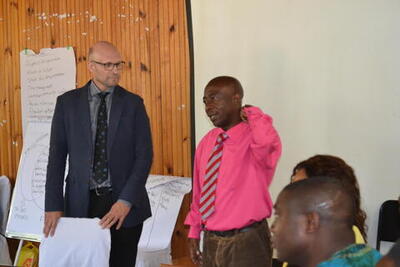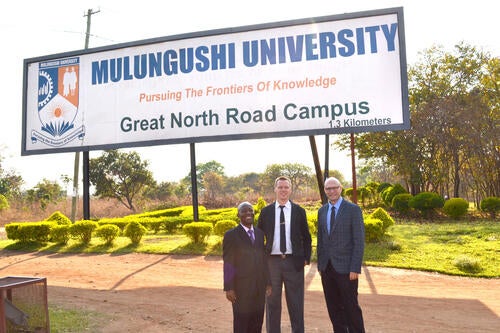Promoting Peace through Good Governance of Organizations and Systems Delivering Services
Rod Friesen graduated from Conrad Grebel University College in 2013 from the Master of Peace and Conflict Studies (MPACS) program. He began working with Mennonite Central Committee (MCC) Ontario in May 2017, where he oversees several service delivery and restorative justice-related projects in his role as a Restorative Justice Program Coordinator. MCC’s Restorative Justice programs help individuals and churches find healthy ways to deal with harm and conflict, as well as respond to and prevent violence and sexual abuse. Circles of Support and Accountability (CoSA) is one program that walks alongside at-risk sexual offenders through regular accountability circles that provide key supports to aide them in meeting their goals of living in community without engaging in reoffending behavior. Faith and Community Reintegration Projects (FCRP) work to link individuals returning from incarceration to supportive faith communities. Rod’s primary goal is to promote peace to communities through the good governance of organizations and systems delivering services.
 In 2019, Rod was asked by MPACS alumnus, Issa Ebombolo, to develop and deliver a four-day training program to a group of prison officers who were launching the Zambia Correctional Service Restorative Justice and Peacebuilding Unit. “I met Issa when he did his MPACS degree and I was co-teaching PACS 603, Building Civil Society,” Rod recalled. “Issa was looking for someone in our MCC network that could support Restorative Justice training who had a background working with individuals returning to community from prison.” Since his initial trip to Zambia, Rod has continued to co-facilitate workshops online to teach Restorative Justice skills and principles. And together with Issa, they train lecturers so that they can implement Restorative Justice programming for prison officers.
In 2019, Rod was asked by MPACS alumnus, Issa Ebombolo, to develop and deliver a four-day training program to a group of prison officers who were launching the Zambia Correctional Service Restorative Justice and Peacebuilding Unit. “I met Issa when he did his MPACS degree and I was co-teaching PACS 603, Building Civil Society,” Rod recalled. “Issa was looking for someone in our MCC network that could support Restorative Justice training who had a background working with individuals returning to community from prison.” Since his initial trip to Zambia, Rod has continued to co-facilitate workshops online to teach Restorative Justice skills and principles. And together with Issa, they train lecturers so that they can implement Restorative Justice programming for prison officers.
Support and collaboration with other organizations is a crucial part of MCC’s work. Besides placing MPACS students in internships within the Restorative Justice program, MCC partners with many organizations across Southwestern Ontario to assist their work in reintegration. “In terms of restorative practice, I would say that we keep learning from each other,” Rod explained. “One aspect of Restorative Justice that we are becoming more aware of is the importance of Restorative Justice practices and the need to be culturally applicable and relevant to the individuals and communities we serve.”
Inspiration drives us and keeps us moving, a reward in itself. Spending the past three decades of his life working in the nonprofit sector has inspired Rod to continue moving forward with promoting peace with MCC. “Part of it was that my Mennonite upbringing instilled in me a desire to serve,” he said. Rod also attributes his dedication to his long-ago front-line experience with MCC Serving and Learning Together (SALT) in Ontario, teaching individuals with intellectual disabilities the tasks of daily life so that they could live in community settings. “It was formative and began my journey into working in nonprofit organizations that support people in that community who are marginalized.” 
Grebel was another noteworthy inspiration for Rod. His time at the College motivated him to think more locally about his work. “Taking MPACS was helpful to reframe and reflect on system-level change and how all organizations—whether government, private sector, or nonprofit—can work together for a stable and peaceful society.”
Restorative Justice is an ever-growing practice that is slowly taking on legitimacy in Canada through a “continuum of approaches from partially restorative work like CoSA, to more fully restorative work where relationships are restored through facilitated dialogue between victims and offenders.” But the truth of the matter is that many do not know what Restorative Justice is or strives to accomplish. “Essentially, our work is about addressing harms and meeting the needs for all,” Rod explained. “In this process, those who have caused harm can also have an obligation and can take the opportunity to repair the harm caused as much as possible or permissible.”